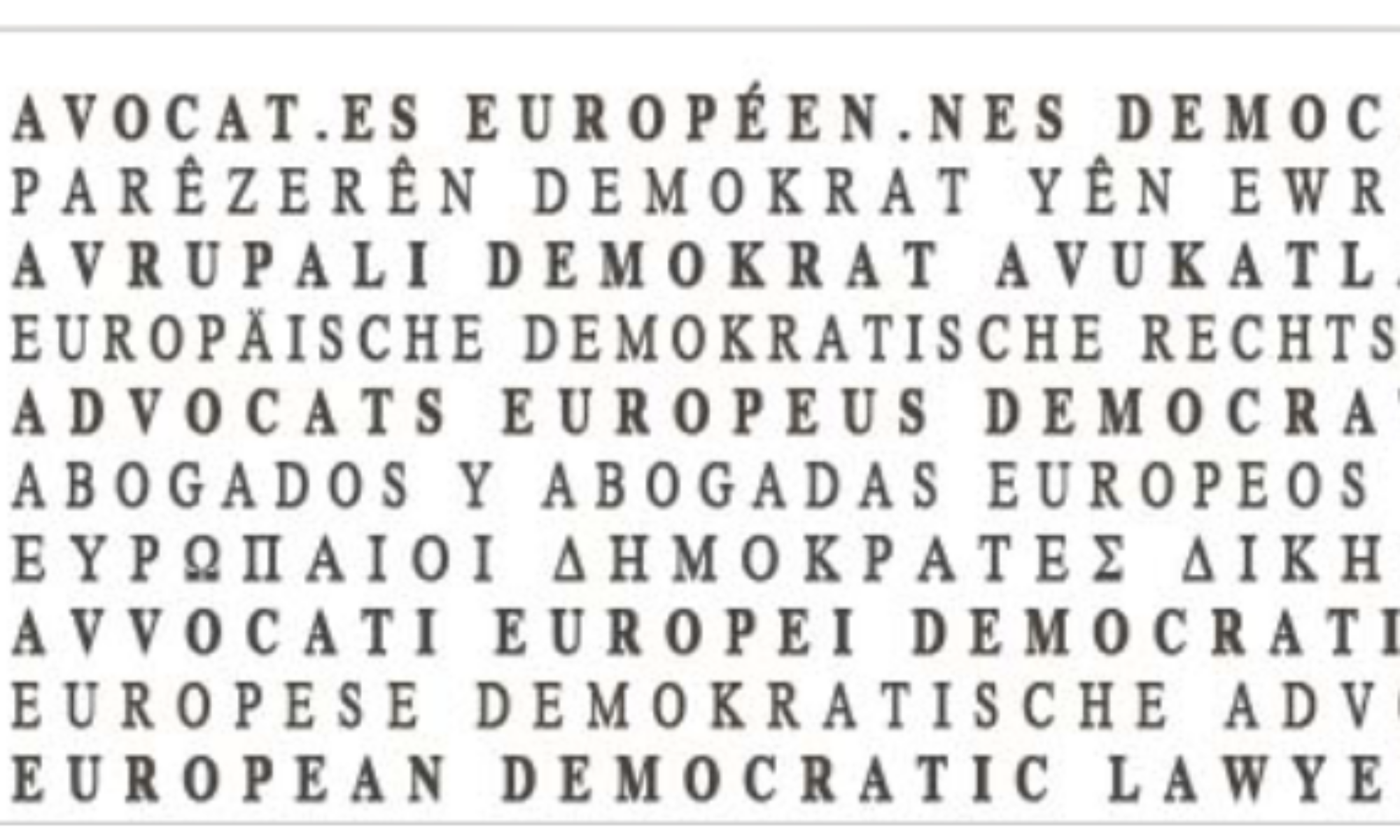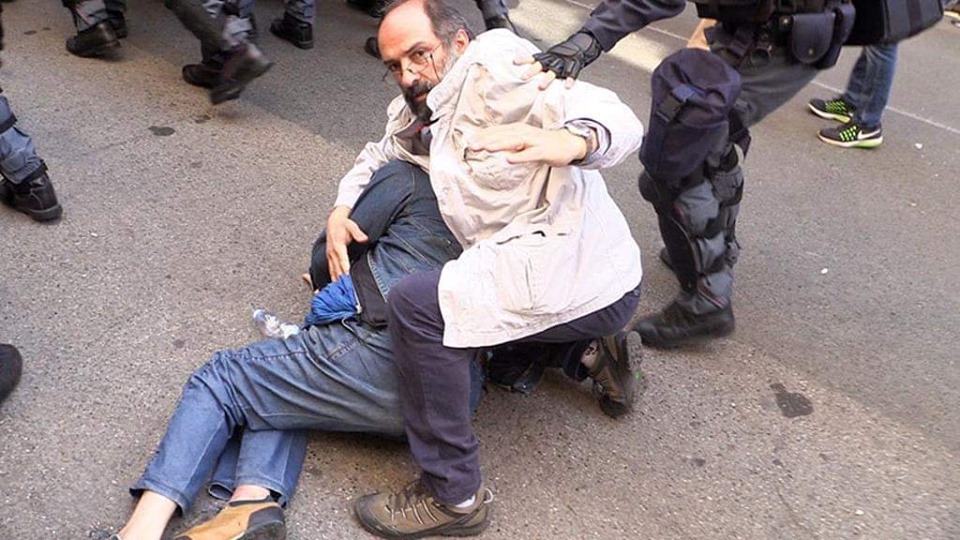in English:
Berlin, on the 23rd of November 2019
The AED was part of the dozens of international organizations monitoring the Trial on the Catalan Referendum Case in Madrid. In a statement this February we warned of the lack of procedural guarantees and the danger of violating human rights if there were a conviction.
On Monday, the 14th of October, the Spanish Supreme Court issued an unprecedented ruling in Europe, condemning the Catalan political and social leaders to a total of 100 years in prison. In this sentence, peaceful demonstrations or peaceful resistance represented the crime of sedition (“public uprising and tumultuary“). This sentence clearly restricts the exercise of freedom of expression, the right to peaceful assembly, as well as public political participation.
The Court dropped the State Prosecutor’s charges of rebellion, but issued severe sentences for the crimes of sedition, embezzlement of public funds, and disobedience, in the context of the Referendum on the Independence of Catalonia, on the 1st of October 2017.
The AED recalls that the referendum was a non-violent act of civil disobedience, organized peacefully to allow the voices of many Catalans to be heard. The only violence on the 1st October was perpetrated by the Spanish Police, in actions of disproportionate violence.
AED considers:
– These have been political proceedings, putting people on trial for their political ideas.
– The prison sentences imposed represent a historical error, which, far from solving the problem, worsens it.
– The powers of the Spanish Kingdom have done nothing to resolve this situation, which should have been solved politically through dialogue, and not through the involvement of the judicial power and therefore with the intervention of the State Prosecutor’s Office, directly appointed by the Spanish Government.
– Far from providing any solution, the verdict against the political prisoners shifts the conflict to the European arena and the international courts of Justice, which will not solve the problem either. If the international community, particularly the European Union, does not play an active role in helping resolving the conflict, an international call for dialogue and a peaceful and democratic solution is needed.
AED condemns the violation of Human Rights (civil and political rights listed and recognized by Treaties and Conventions dully signed by the Kingdom of Spain), the violation of criminal and procedural principles, as well as the criminal law principles of fragmentation, proportionality and last resort, by the criminal proceedings and its sentence of last 14th of October 2019.
The grave violation of the abovementioned rights and principles in this sentence and its logic, renders it impossible to analyze from a strictly legal point of view. Any earnest attempt at interpreting this sentence based on technical and legal concepts, such as sedition, uprising, violence or fundamental right becomes partially unsuccessful. The reason is because it is an ideological resolution aimed at replacing the political solution that is needed in the conflict in Catalonia.
AED asks the executive powers of both the Spanish and Catalan governments to seek through dialogue and compromise to end the criminal response to the underlying political problem, to put an end to the repression by police, to free the prisoners and bid the safe return of the exiles and, instead, finally seek to start a negotiation to find a political solution to the conflict based on dialogue and respect.
in French:
Motion sur l’arrêt de la Cour suprême espagnole sur l’affaire du référendum catalan
Berlin, le 23 novembre 2019
L’AED a participé avec dizaines d’organisations internationales dans l’observation du procès sur l’affaire du référendum catalan. Dans une déclaration faite en février dernier nous avons mis en garde contre l’absence de garanties procédurales et le risque de bafouer les droits de l’homme des accusés en cas de condamnation.
Lundi 14 octobre, la Cour suprême espagnole a rendu un arrêt sans précédent en Europe, condamnant les dirigeants politiques et sociaux catalans à 100 ans de prison au total. Dans cette arrêt, les manifestations pacifiques ou la résistance pacifique représentaient le crime de sédition (“soulèvement public et tumulte”). Cette phrase restreint clairement l’exercice de la liberté d’expression, le droit de réunion pacifique, ainsi que la participation politique publique.
La Cour a abandonné les accusations de rébellion portées par le Procureur de la République, mais a prononcé des peines sévères pour les crimes de sédition, de détournement de fonds publics et de désobéissance dans le cadre du référendum sur l’indépendance de la Catalogne, le 1er octobre 2017.
L’AED rappelle que le référendum était un acte non violent de désobéissance civile, organisé pacifiquement pour permettre à de nombreux Catalans de faire entendre leur voix. La seule violence du 1er octobre a été perpétrée par la police espagnole, dans des actes de violence disproportionnée.
L’AED observe que
- Il s’agit de procédures politiques, de poursuites judiciaires contre des personnes pour leurs idées politiques.
- Les peines d’emprisonnement imposées représentent une erreur historique qui, loin de résoudre le problème, l’aggrave.
- Les pouvoirs du Royaume d’Espagne n’ont rien fait pour résoudre cette situation, qui aurait dû être résolue politiquement par le dialogue, et non par la participation du pouvoir judiciaire et donc par l’intervention du Procureur, directement nommé par le gouvernement espagnol.
- Loin d’apporter une solution, le verdict contre les prisonniers politiques déplace le conflit vers l’arène européenne et les tribunaux internationaux de justice, ce qui ne résoudra pas non plus le problème. Si la communauté internationale, en particulier l’Union européenne, ne joue pas un rôle actif dans la résolution du conflit, un appel international au dialogue et à une solution pacifique et démocratique est nécessaire.
L’AED condamne la violation des Droits de l’Homme (droits civils et politiques énumérés et reconnus par les Traités et Conventions dûment signés par le Royaume d’Espagne), la violation des principes pénaux et procéduraux, ainsi que les principes de fragmentation, de proportionnalité et de dernier recours du droit pénal, par cette procédure pénale et l’arrêt du 14 octobre 2019.
La violation grave des droits et principes susmentionnés dans cette phrase et sa logique rendent impossible une analyse d’un point de vue strictement juridique. Toute tentative sérieuse d’interprétation de cette phrase fondée sur des concepts techniques et juridiques, tels que la sédition, le soulèvement, la violence ou les droits fondamentaux, échoue partiellement. La raison en est qu’il s’agit d’une résolution idéologique visant à remplacer la solution politique nécessaire dans le conflit en Catalogne.
L’AED demande aux pouvoirs exécutifs des gouvernements espagnol et catalan de chercher, par le dialogue et le compromis, à mettre fin à la réponse criminelle au problème politique sous-jacent, à mettre fin à la répression policière, à libérer les prisonniers et à demander le retour des exilés en toute sécurité et, enfin, à entamer une négociation pour trouver une solution politique au conflit basée sur le dialogue et le respect.























